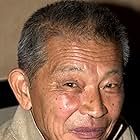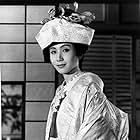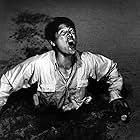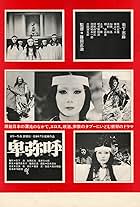Chinmoku
- 1971
- 2h 9m
IMDb RATING
7.1/10
1.3K
YOUR RATING
Two Jesuit priests encounter persecution when they travel to Japan in the 17th century to spread Christianity and to locate their mentor.Two Jesuit priests encounter persecution when they travel to Japan in the 17th century to spread Christianity and to locate their mentor.Two Jesuit priests encounter persecution when they travel to Japan in the 17th century to spread Christianity and to locate their mentor.
- Awards
- 4 wins & 2 nominations total
Featured reviews
A couple of people compare this earliest adaptation of Shusaku Endo's 1966 novel with Scorsese's, which is rather strange because Shinoda Masahiro is one of the most important directors of the Japanese New Wave, on a par with Nagisa Oshima and Shôhei Imamura - almost as influential for Japanese cinema as Scorsese himself has been. Oshima is popular in the West because his films emulate the Nouvelle Vague, and Imamura won the Golden Palm twice because of his universal approach to class struggle. Shinoda is more difficult to relate to because he relies on cultural metaphors which are difficult to decipher for foreigners.
"Silence" is not his best film if you know the novel, for which Endo was long expected to receive the Nobel Prize. The book describes the story of two missionaries arriving in Japan after the ban on Christianity matter-of-fact from the perspective of the priest Rodrigo, who undergoes a transformation from spiritual idealization to materialistic resignation. Shinoda faithfully adapts the dialogue-heavy plot and adds color symbols and a good deal of sadistic voyeurism, but this doesn't work well. There is too much contrast between intellectual discourse and violent imagery, although the idea might be that you cannot reconcile the two.
What makes "Silence" still more interesting than Scorsese's film is the perspective. Instead of foreigners observing their Japanese surroundings, it is the Japanese class system which observes the foreigner, and his ultimate capitulation derives from realizing that he can not be a subject, only an object of his faith.
"Silence" is not his best film if you know the novel, for which Endo was long expected to receive the Nobel Prize. The book describes the story of two missionaries arriving in Japan after the ban on Christianity matter-of-fact from the perspective of the priest Rodrigo, who undergoes a transformation from spiritual idealization to materialistic resignation. Shinoda faithfully adapts the dialogue-heavy plot and adds color symbols and a good deal of sadistic voyeurism, but this doesn't work well. There is too much contrast between intellectual discourse and violent imagery, although the idea might be that you cannot reconcile the two.
What makes "Silence" still more interesting than Scorsese's film is the perspective. Instead of foreigners observing their Japanese surroundings, it is the Japanese class system which observes the foreigner, and his ultimate capitulation derives from realizing that he can not be a subject, only an object of his faith.
16 February 2017 The basis for this film is a best selling novel written by a Japanese Catholic writer in the 1960's. Two Jesuit priests from Portugal are sent to Japan for two reasons. Fathers Rodrigues and Garrpe are looking for Father Ferreira, who has disappeared with the rumor of having renounced his faith. Along the way, the good reverends discover groups of Catholics in hiding. The punishment for practicing the tenets of the church of Rome are quite brutal, including a crucifixion from low tide to high tide with the unfortunate parishioner's death by drowning. Rodrigues and Garrpe will be severely tested by government officials who claim to be defending their one true religion, Buddhism. This all leads to some deep theological and philosophical discussions and some horrendous and inventive acts of not so gentle persuasion. The two hours plus here will not restore your faith in humanity or religion. Martin Scorcese released a newer, more technically adept version in 2016. This 1971 original tells the same story with some slight variations. Both films are filled with the director's good intentions and each has succeeded in producing works of art that will at least cause the viewers to think about the meaning of life.
10yimaidh
This historical movie tells the story of Rodrigo, a Portuguese priest who suffered from the suppression of Christianity in the early Edo period and found himself on the verge of apostasy. Word reaches Rome that Father Ferreira has apostatized after being severely tortured in Japan. Ferreira's disciple, Rodrigo, goes to Japan to find out the truth, but is captured by the magistrate after being tipped off by Kichijiro. Rodrigo begins to doubt God, wondering "Why does God remain silent while he watches me suffer?" Then he steps on the treadmill. A masterpiece depicting the anguish of apostates. The original author, Shusaku Endo, was nominated for the Nobel Prize in Literature. Graham Greene, a strong advocate of Endo, praised the novel as "In my opinion one of the finest novels of our time." Endo was baptized in junior high school. Realizing the contradiction between being Japanese and Christian, he chose to make a lifelong effort to reexamine Christianity as a Japanese. I had mixed feelings about this film because my family is Nichiren Buddhist, I myself graduated from a university with Protestant founding principles, and I have an American friend who is a Catholic woman. Director: Masahiro Shinoda Cast: David Lampson, Shima Iwashita, Mako Iwamatsu.
Because outside some dialogues and similar scenes I honestly don't see nothing identical between the two. What I saw is bad acting from the main american lead who evidently could not care less to learn some portuguese (why you talk in english if you're gonna be subbed anyway? Go straigh for portuguese), general boredom, scenes that are meant to be powerful and emotional yet they're not felt in any way like the martyrdom of the three christians from the first village and the death of Father Garrupe, cheesy scenes with prostitutes of whom the Japanese must have had some serious infatuation back in the day seeing how they were a constant presence in the movies of this era, bad acting again from the guy who portrays Father Ferreira, a lot of "Tell, don't show" that Scorsese intelligently avoided, and so on...also, the thematics could not be different since here there are no questions about the existance of god or not, it's not what the movie focuses on. The movie just wants to portray an historical event as it is, with no personal questions of faith inbetween, like Scorsese tried to do with his work. Honestly, even if I'm not a religious guy in any way, I suggest you to rewatch the excellent scorsese flick instead of watching this dreck. Avoid it, even if the snob Japanese cinema connoseurs say you otherwise.
Masahiro Shinoda's take on Shusaku Endo's most important novel is an artistically risky and bravely filtered effort. Ultimately, 1971's "Chinmoku" succeeds in being the definitive film adaptation of the source material.
On the other hand, Martin Scorsese's later adaptation, while visually stunning, can't hold a candle to "The Last Temptation of Christ"; his magnum opus when it comes to religious thematics. In the case of "Silence", Scorsese's approach is not indicative of a similar radical zeal compared to Shinoda's; an attitude that perhaps stems from a Catholic Christian's need to reconcile with his church after "The Last Temptation" caused a negative uproar among Christian fanatics. No one can blame him, as long as he decides to remain fairly faithful to the main core of the novel of a... Japanese Catholic. That said, the film comes across as much more one-sided and noticeably less provocative than Shinoda's.
For instance, the 2016 film makes an unnecessary effort to idealize the protagonist, whose character has much more moral gray areas as portrayed in the book. There's also a dedication to the numerous Jesuit martyrs in Japan when the end credits begin to fall.
On the contrary, in the impeccable Japanese production of 1971, the divine presence is never confirmed, while the cynical finale adds to the ambiguity of the film, also keeping the flame of interest alive on crucial themes, which are analyzed more adequately: The "western" motives of proselytizing missions (priests are reduced to blind soldiers of a culture war), the historical background and the circumstances that caused the Japanese authorities to prohibit Christianity and marked the opening of a bloody cycle of intolerance, and the dilemma of fulfilling a higher purpose at the cost of prolonging the torture of innocents.
On the other hand, Martin Scorsese's later adaptation, while visually stunning, can't hold a candle to "The Last Temptation of Christ"; his magnum opus when it comes to religious thematics. In the case of "Silence", Scorsese's approach is not indicative of a similar radical zeal compared to Shinoda's; an attitude that perhaps stems from a Catholic Christian's need to reconcile with his church after "The Last Temptation" caused a negative uproar among Christian fanatics. No one can blame him, as long as he decides to remain fairly faithful to the main core of the novel of a... Japanese Catholic. That said, the film comes across as much more one-sided and noticeably less provocative than Shinoda's.
For instance, the 2016 film makes an unnecessary effort to idealize the protagonist, whose character has much more moral gray areas as portrayed in the book. There's also a dedication to the numerous Jesuit martyrs in Japan when the end credits begin to fall.
On the contrary, in the impeccable Japanese production of 1971, the divine presence is never confirmed, while the cynical finale adds to the ambiguity of the film, also keeping the flame of interest alive on crucial themes, which are analyzed more adequately: The "western" motives of proselytizing missions (priests are reduced to blind soldiers of a culture war), the historical background and the circumstances that caused the Japanese authorities to prohibit Christianity and marked the opening of a bloody cycle of intolerance, and the dilemma of fulfilling a higher purpose at the cost of prolonging the torture of innocents.
Did you know
- TriviaShusako Endo hated the ending of the film which the director changed against Endo's wishes.
- ConnectionsVersion of Silence (2016)
- How long is Silence?Powered by Alexa
Details
- Runtime
- 2h 9m(129 min)
- Sound mix
- Aspect ratio
- 1.33 : 1
Contribute to this page
Suggest an edit or add missing content


























